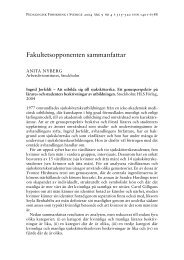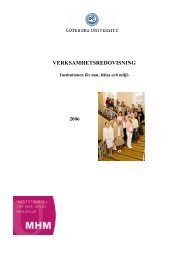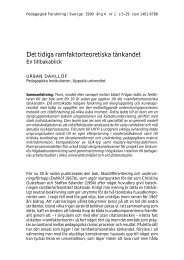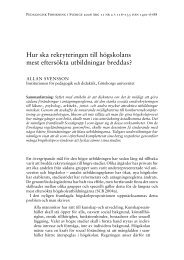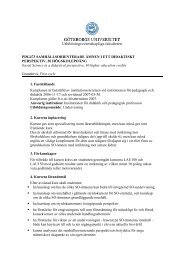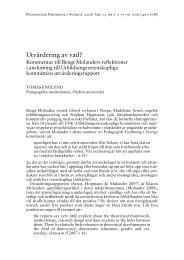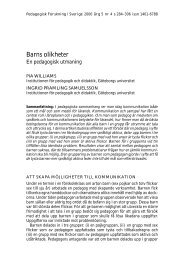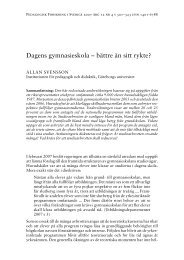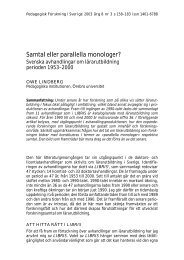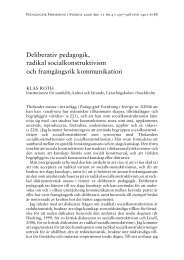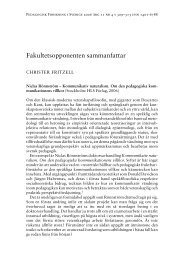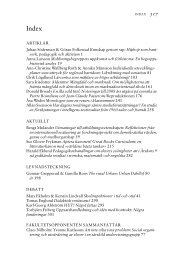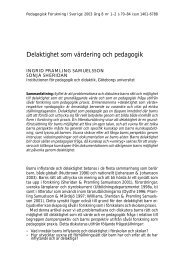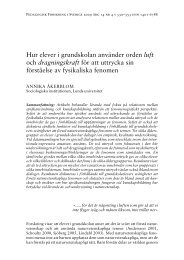University of Oslo Workshops June 29-30 Conference July 1-3 ...
University of Oslo Workshops June 29-30 Conference July 1-3 ...
University of Oslo Workshops June 29-30 Conference July 1-3 ...
You also want an ePaper? Increase the reach of your titles
YUMPU automatically turns print PDFs into web optimized ePapers that Google loves.
structure there is less educational inequality than in a system where consequential<br />
decisions about the educational career are taken at a very young age. On that account,<br />
grouping according to student performance has been one <strong>of</strong> the most controversial issues in<br />
education for more than 80 years. Its effects, particularly on student achievement, have<br />
been extensively studied over that time period, mainly in United States and Great Britain.<br />
In the Czech Republic tracking is very extensive and starts from very young age. In all<br />
international comparative studies <strong>of</strong> student achievement the Czech Republic exhibits a<br />
relatively strong relationship between student achievement and family background.<br />
National analyses show high differences between achievement and social composition <strong>of</strong><br />
students in individual tracks. In last decade the differentiation <strong>of</strong> Czech education system<br />
at the primary and lower secondary level has been escalating. The data from the IEA<br />
TIMSS study show that the growing differentiation <strong>of</strong> educational pathways leads to the<br />
growing differentiation <strong>of</strong> student achievement and learning experience <strong>of</strong> students in<br />
various schools and tracks. The analysis, using the hierarchical linear modeling approach,<br />
is carried out on data from TIMSS 1995, TIMSS 1999 and TIMSS 2007.<br />
Keywords: educational inequalities: student achievement; socio-economic background;<br />
tracking; learning conditions<br />
Why has Average Achievement in Mathematics in the Czech Republic<br />
Decreased since 1995 according to TIMSS Results?<br />
Josef Basl, Institute for Information on Education, Czech Republic<br />
Vladislav Tomasek, Institute for Information on Education, Czech Republic<br />
<br />
In TIMSS 1995, students from the Czech Republic showed very good achievement in both<br />
fields tested. During the following cycles, however, a significant decrease in average<br />
achievement occurred. This text aims at identifying causes that are likely to have<br />
contributed to the decrease in students’ average achievement in mathematics ascertained<br />
for the Czech Republic on the basis <strong>of</strong> the international TIMSS survey. The purpose <strong>of</strong> this<br />
paper is to give an outline <strong>of</strong> factors which may have influenced the decline in average<br />
achievement in mathematics among Czech eighth-grade students since 1995. Our work has<br />
been based on a presumption that besides factors that can be expressed by standard<br />
variables (school type, gender, etc.), the achievement has also been influenced by less<br />
easily operationalizable factors which, in addition, reflect a certain development over time.<br />
On the whole, it can be stated that while the influence <strong>of</strong> school type and the “I like math”<br />
variable on mathematics achievement does not decline in the course <strong>of</strong> individual TIMSS<br />
cycles, the impact <strong>of</strong> parents’ education did decrease. This finding unfortunately confirms<br />
the fact that various types <strong>of</strong> schools and various schools in the Czech Republic show a<br />
relatively high degree <strong>of</strong> homogeneity in terms <strong>of</strong> students’ socioeconomic background. In<br />
terms <strong>of</strong> average achievement, scores <strong>of</strong> boys and girls have converged significantly, which<br />
has also been confirmed by our models. As for the less easily operationalizable aspects, we<br />
focused on the analysis <strong>of</strong> the changes to the mathematics curriculum <strong>of</strong> basic education<br />
between 1995 and 1999. We found out that the decline in Czech students’ rate <strong>of</strong> success in<br />
trend items from 1995 to 1999 can, to a certain extent, be explained by the shift <strong>of</strong> the<br />
curriculum. Attention was also given to the reduction in the amount <strong>of</strong> time allocated to the<br />
<strong>30</strong>



